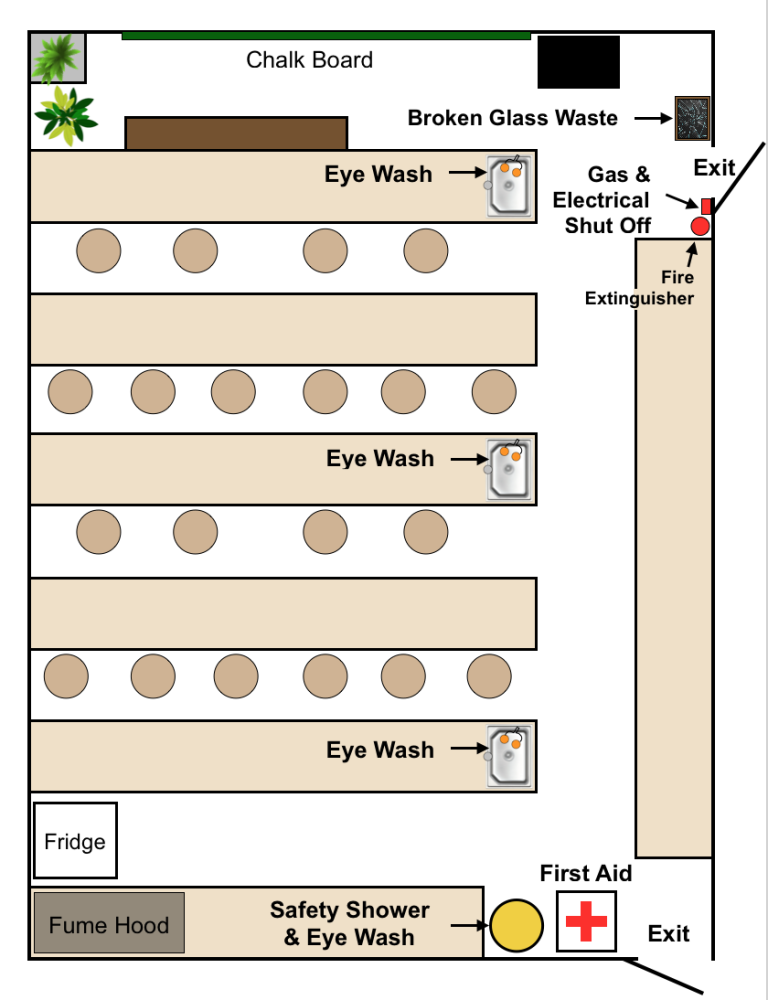Safety is an important component of any lab experience as it not only ensures your survival but contributes to your lab success and safeguards your natural beauty, fertility, and ability to effectively interact with the world around you. Danger may lurk around every test tube and Erlenmeyer flask but with some common sense and conscientiousness you too can have a successful and incident free lab experience!
Safety instructions will be given in each lab specific to the hazards you will be encountering in that lab’s given activity but the following are some general rules and guidelines that apply to all labs in the Biology Department.
Safety Rules:
Attire
You are required to arrive in the following:
- Pants of other attire which provide complete leg cover.
- Shoes that cover the entire foot: i.e. no flip flops, Birkenstocks, or ballet shoes.
- Lab coats (some field based courses are an exception but bring a lab coat until you are instructed to do otherwise)
Note: Lab coats are to be worn in the lab, not in the hall or outside.
If you have been graced with long hair, please bring an elastic to tie it back. All contact lens wearers are encouraged to wear glasses.
Failure to arrive in lab appropriate attire will result in denial of entry. If you are of a forgetful nature – be proactive! Sign out a locker or make a friend on campus you can keep an extra change of clothes/shoes at.
Personal Items
Due to the limited space in lab as well as the nature of some lab activities, bags and personal items such as jackets, purses, ipods, cell phones etc, are not permitted in the lab. Temporary, as well as long-term use lockers are available and you are strongly encouraged to take advantage of them. Belongings are not allowed to be unattended in the hallways as this makes the biology department a target area. Things left in the hallway may be taken away.
Cameras (and by extension cell phones) are allowed in some labs (at the discretion of your instructor), however, they will be at risk of contamination from lab material. Always wash your hands before touching your camera/cell phone.
Food and Drink
Food and drink are NOT allowed in the lab. This includes not just your lunches but water bottles, chewing gum, etc.
Remember that putting anything in your mouth essentially becomes the equivalent of food. Avoid putting pens, pencils, fingers, etc. in your mouth while in lab.
Personal Protective Equipment
Some of the lab activities involve working with, or in the vicinity of, various hazardous materials. In these instances you will be required to use personal protective equipment such as gloves and safety glasses (provided in lab). Use them! Safety glasses must be worn when working with impacting objects, harmful substances, UV light, solutions in activities that present a splashing hazard, etc.
Nitrile gloves should only be worn in the lab – if you have to leave, discard your gloves in the appropriate waste bin and get a new pair upon returning.
Handling Chemicals
Read the label carefully before using any chemicals, and note potential hazards. Aquire any safety equipment if necessary. If a small amount is being taken back to your workstation and there is some left over, do not return it to the original bottle. Instead follow the proper waste disposal instructions.
Waste Disposal
You will be working with a wide range of chemicals during your time in the Biology Department and contrary to popular belief, sinks and garbage cans are not your universal disposal solution. DO NOT assume you can simply pour your finished experiment down the drain or throw it in the garbage. Your lab instructor will provide you with specific waste disposal instructions for each experiment and when in doubt – ask!
Health Concerns
If you have any health concerns (allergies, conditions, disabilities, etc.) this should be indicated to the instructor at the beginning of the course.
Pregnancy
As there are a number of chemicals commonly used in the lab that can be very harmful to an unborn child, if you become pregnant during the course of your studies you may want to inform your lab instructor so your activities can be adjusted accordingly.
Housekeeping and Lab Etiquette
Essential skills and practices:
- Keep your work space tidy and be sure to clean your area when you are done. It should be left looking as it did when you arrived. Not only is this good etiquette but working clean prevents accidents and often improves your efficiency in the lab ( you will be out sooner!).
- Come prepared to lab. Trying to get your head into the lab activity when you arrive, often results in needless mistakes which waste time and resources. Save yourself (and those around you) the frustration – read the lab ahead of time!
- The purpose of a lab partner is to share the work not off-load the work. Ensure you are not leaving all the work to your partner – be a team! Your contribution is vital to your learning experience and to your success in getting a partner in future lab courses.
- Follow instructions carefully. This will also reduce the amount of time you spend in lab, and will help prevent accidents. Do not touch or use things if you do not have permission to do so.
- Do not leave heating elements (Bunsen burners, hot plates) unattended. These need to be monitored at all times.
- Broken glass should NEVER be disposed of into the regular garbage waste. There is a specific box in every lab that is dedicated specifically to glass waste. This ensure our custodians will not be harmed by sharp glass.
To encourage you in these good work habits, some labs may include a technique mark.
Horseplay
Horseplay in the lab is not permitted. Inappropriate behavior will result in your dismissal from the lab. Please save those amusements and mating rituals for less hazardous locations on campus.
Accidents & Emergencies:
Emergency Equipment
Fire extinguishers and eye wash stations are located in every lab. Some of the labs have safety showers or eye wash stations that can be removed and used as a shower head. Ensure you know their location and how to use them.
Accidents and Spills
All accidents or chemical spills must be reported to you lab instructor IMMEDIATELY. This includes any personal injury or damage to the lab/equipment. An incident or spill that may seem embarrassing or minor to you may be a larger problem and your instructor needs to know about it. Depending on the situation, a first aid incident sheet or accident/investigation form may need to be filled out.
Usually minor accidents (paper cuts, small nicks, etc.) require a first aid incident sheet to be filled out.
If you cause damage to any lab equipment, an accident/incident investigation form may need to be filled out.
Earthquake Procedure
During an earthquake:
- Don’t panic!
- Don’t attempt to leave the building.
- Get under a lab bench or similar structure that will create a space if things fall on it.
- Stay away from windows, cupboards, or experimental setups.
After an earthquake:
- Remember that aftershocks often occur and can cause just as much, if not more, damage as the initial quake.
- Check for injuries to yourself or those around you.
- Before moving, ensure there are no hazards present such as gas leaks (can you smell anything?), fire hazards, chemical spills, physical hazards (is there any structural that is likely to fall?) as a result of the quake.
- Evacuate the building to a designated area.
Fire Alarm Procedure
Labs pose a significantly higher fire risk than classrooms and thus it is very important to evacuate quickly and orderly in the event of a fire alarm.
- Everyone MUST leave the building. This is not optional! Be sure you are familiar with the fastest route for evacuating your lab.
- Close all doors and windows. Doing so prevents fires from spreading as quickly and gives occupants valuable time to escape.
- Ensure the gas mains are off.
- Ensure that electrical equipment such as hotplates, etc. are unplugged.
- Stay together as a group until your lab instructor has ensured everyone is safely out of the building and has given you permission to leave.
- Stay far enough away from the building to accommodate the threat of explosion & leave room for emergency vehicles to access the building. You must be on the East side of the building, congregating in the field between the Music Building and Neufeld.
- Do not return to the building until the Fire Chief has given your lab instructor the all clear.
Lockdown Procedure
Although incredibly unlikely, a lockdown procedure will be initiated in the event of something like an active shooter. This will be broadcasted through TWU Alerts messages (text, computer screens, email), posted on the University website, and sent via TWU email.
- Stay in the lab. If for any reason you are not in the lab, quickly make your way to the nearest office, classroom, or lab. Avoid washrooms and open areas.
- Quickly warn others nearby
- Immediately lock and barricade all doors if able.
- Close and lock windows. Close all the blinds if possible.
- Turn off lights and audio equipment. Make sure to turn your cellphone to silent.
- Stay quiet and try to remain calm. Do not leave your place of shelter until you have been advised by a police officer and/or University authorities that it is safe to leave.
Power Outages
In the event of a power outage – don’t panic! The Neufeld Science Centre is equipped with a backup generator and thus all labs will continue to run as normal.
First Aid Procedure
If you or someone in the lab is seriously injured, stay calm. Tell your lab instructor who will either go get first aid help or send someone to do so. If necessary, call emergency personnel.
Major accidents require an accident/incident investigation form to be filled out.
Emergency Numbers:
Ambulance, Police, Fire Department: 911 (if using the lab phone, dial 9-911)
TWU Security (First Aid): 604-513-2099
TWU Medical Clinic: 604-513-2024
BC Drug and Poison Info: 1-800-567-8911
When calling an emergency number give the location of the emergency:
Trinity Western University
Neufeld Science Centre
7600 Glover Road
Langley, BC
If emergency personnel are called, it is recommended to send someone to meet them at the Welcome Centre to direct them to the location of the emergency.
Lab Map
Neufeld A101




Post your comment on this topic.